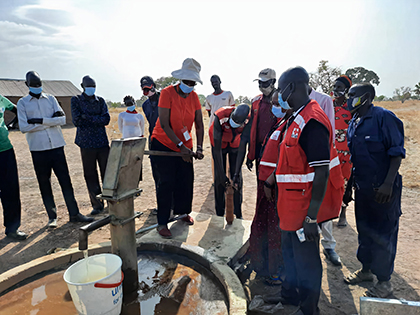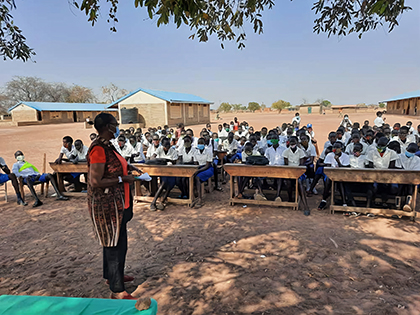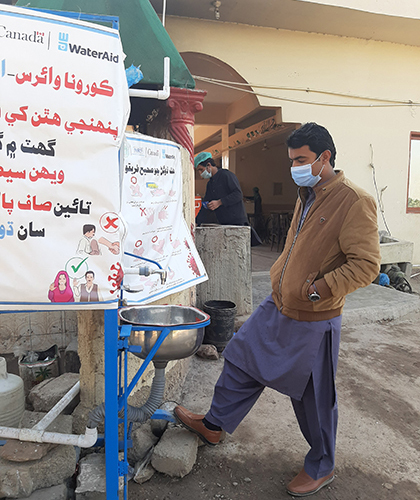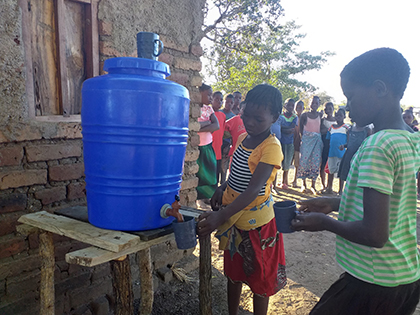Pandemic highlights water challenges and opportunities in developing countries


Improvements in water and sanitation in South Sudan include the installation or repair of well boreholes and hand-pumps at primary schools. Photo: Canadian Red Cross
When the COVID-19 pandemic hit in March 2020, everyone around the world quickly began to learn when and how to wash their hands to avoid and contain the rapid spread of the virus.
These lessons were especially challenging for the people of Gogrial West, a county in South Sudan where there is limited access to water and soap, and little awareness of proper handwashing practices.
What a difference a year makes. Through a project supported by Global Affairs Canada and implemented by the Canadian Red Cross, schools, communities and some homes there have had hand-pumps installed or repaired, and have received training to help improve hygiene practices.
“These places did not have designated locations for handwashing, with continuous access to water and soap,” says Medoline Lema, country representative for the Canadian Red Cross in South Sudan. She knows these difficulties well, having grown up in a remote village in Tanzania and having worked in international development for the last 30 years.
Water brings generational change
Lema immigrated to Canada in 2011 and sees the emphasis that her neighbours in Mississauga place on hygiene, with far different standards for cleanliness than elsewhere. “They say, ‘You can’t come into my house because it’s not clean,’” she says, while in South Sudan, school latrines are in “deplorable” condition. Indeed, half the population of the rural part of the country has no access to any kind of latrine, and open defecation is common. “It’s just not a priority,” she explains, given South Sudan’s history of conflict, not to mention recent periods of flooding and drought, crop infestations, outbreaks of diseases such as cholera as well as tribal tensions—all problems that have been exacerbated by the COVID-19 pandemic. “There are multiple crises happening at the same time.”

Medoline Lema, country representative for the Canadian Red Cross in South Sudan, talks to students about importance of hand hygiene at Emmy Robin Primary School in Kuajok. Photo: Canadian Red Cross
The Red Cross initiative, called Healthy Bodies, Healthy Minds, aims to reduce barriers for girls to attend school by providing safe water, sanitation and hygiene facilities in their schools. Having started in March 2020, it was quickly adapted to include activities in school catchment communities, including COVID-19 prevention, Lema says. Improvements in water and sanitation include the installation or repair of well boreholes, hand-pumps and handwashing points, which are large buckets with taps overseen by a committee made up of community members to ensure that they are filled and that soap is available.
Lema says that improving access to water in Gogrial West can particularly improve the lives and livelihoods of women and girls, who are burdened with carrying household water over long distances and are vulnerable to gender-based violence when wells and sanitation facilities are in unsafe places. Adolescent girls often stay home from school during their menstrual periods because there are no adequate or private sanitation facilities there. Their frequent absenteeism as well as water-fetching duties often force them to drop out of the education system altogether.
Raising awareness is critical to changing cultural practices around safe water in the community, Lema says. This means holding special celebrations such as Hand Hygiene for All Day in October and World Toilet Day in November. She’s especially encouraged to see children “speaking very convincingly” about the importance of better hygiene at such events. “It may be generational change, but it will be change,” she says.
Everything trickles together

WaterAid Pakistan engineer Moosa Lashari demonstrates a new handwashing station outside of the Café Kamran hotel in Garo. Photo: Sehar Taimoor/WaterAid Pakistan
In Pakistan, a project supported by Canada called HerWASH aims to improve the sexual and reproductive health and rights of women and adolescent girls through improved menstrual health. Sarah Schattmann, project manager for WaterAid Canada—which is implementing HerWASH in Pakistan as well as in Burkina Faso, Liberia and Sierra Leone—says that a significant element is improving water, sanitation and hygiene facilities. This especially means rehabilitating latrines in schools and health-care centres to ensure that they are accessible, gender-sensitive and equipped to meet the menstrual-hygiene management needs of women and girls.
With the pandemic, these efforts have been expanded to include “emergency hygiene behaviour change” measures to keep the community safe. “WaterAid has been focusing on hygiene for 40 years, but COVID-19 has brought handwashing and hygiene to the forefront and highlighted the vital importance of good hygiene for disease control and prevention,” she comments.
The organization and its implementing partner in Pakistan, the National Rural Support Programme (NRSP), are installing handwashing stations in key community locations like in Garo, a rural town on the outskirts of Karachi. That facility, outside a popular hotel called the Café Kamran, is equipped with a foot-pedal to reduce the possibility of users transmitting COVID-19.
Samina Kanwal, who works for NRSP, says the initiative includes a mass hygiene-awareness campaign to ensure that communities “have better knowledge and are taking care of themselves.” She holds monthly information sessions with follow-ups at the household level to reinforce practices such as handwashing with soap. “Usually people wash their hands only with water,” Kanwal explains.
Schattmann says these simple lessons can have a broad impact on everything from health outcomes to gender equality.
“Everything trickles together,” she says, noting that WaterAid collaborates with governments and other players to ensure that the benefits of water and sanitation interventions go well beyond the current global health crisis. “There is an opportunity to leverage the momentum around hygiene and bridge the gap between COVID-19 and other diarrheal diseases and neglected tropical diseases,” she says. “And it’s the best line of defense against future pandemics.”
Behaviour modification improves lives
Affordable and safe hygiene improvements are an important part of a UNICEF project supported by Canada that is designed to advance the education of girls in Mozambique. The initiative in Tete, a rural province in the central part of the country, includes the construction of gender-sensitive sanitation blocks in schools. This means that girls can use separate facilities that include doors for privacy, cabinets in which to keep sanitary products and water to clean themselves.
Alberto Cumbana, a water and sanitation specialist for UNICEF Mozambique, says these “dry latrines” made with underground concrete blocks can be used to compost human waste to make valuable soil amendments. They are a vast improvement over traditional pit latrines, which are open and prone to caving in during the rainy season, while some schools had no water or sanitary facilities at all.

New water points installed at schools in Tete, a rural province in the central part of Mozambique, provide water for handwashing as well as drinking. Photo: UNICEF/2020
Student “sanitation clubs” ensure the proper use and cleaning of the latrines and teach handwashing techniques, he says. New water points are overseen by committees made up of teachers and community members, at least half of whom are women.
School dropout rates for girls have fallen with the new sanitation facilities, he says, while targeting children with hygiene lessons means “they take the message back to their homes.” This ensures that there is lasting behaviour modification, Cumbana explains. “It makes a big difference to the larger community.”
Improving water infrastructure means that girls “have more time to attend school and to do activities like read books and complete schoolwork at home,” Cumbana says. And women can participate in more fulfilling activities than collecting water. “This is a big improvement in their lives.”
He would like to see further improvements that Canada and Canadian technology could assist with in Mozambique, such as solar systems that allow for running water and even flush toilets, which would especially be useful in larger secondary schools. He is hopeful that such enhancements will come, but it all starts with better awareness and a commitment by authorities to make water and sanitation a priority. “Change is slow, but we’re confident that things will improve,” Cumbana adds.
- Date modified: